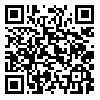BibTeX | RIS | EndNote | Medlars | ProCite | Reference Manager | RefWorks
Send citation to:
URL: http://sjh.umsha.ac.ir/article-1-775-en.html
Botulism is caused by a neurotoxin produced from the anaerobic,
Spore-forming bacterium clostridium botulinum. Botulism have four
clinical forms:1)Food –borne botulism 2)Wound botulism 3)Infant botulism
4)undetermined botulism, that the most common is food-borne botulism.
Botulism in humans is usually caused by toxin types A, B, and E, that is a rare
but serious disease. Botulism is characterized by symmetric , descending ,
flaccid paralysis of motor and autonomic nerves. Petosis , blurred vision ,
diplopia,dysphagia and dysarthria are common initial complaints. The
diagnosis of food-borne botulism is based on clinical findings with the
detection of toxin in patient,s stool, serum or detection of clostridium
botulinum bacteria in the stool .
In this study four patients with food-borne botulism are discussed.
The most common presentations of patients were weakness in exterimities,
petosis, blurred vision, diplopia, and dysphagia. The patients had no fever
and no sensory dysfunction. In three stool specimens of patients reported
positive for toxin of botulinum.
All of the patients treated with trivalent equine antitoxin(ABE). The
patients improved completely after 1.5 months of discharge. Conclusion:
In any acute symmetric, descending , flaccid paralysis patient , we should
think about botulism.
| Rights and permissions | |
 |
This work is licensed under a Creative Commons Attribution-NonCommercial 4.0 International License. |





